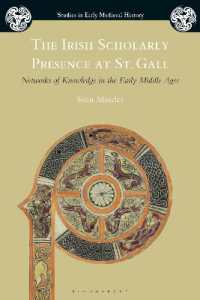Full Description
Identifies diverse language uses in sociolinguistically underexplored formal domains of education in South Asia.
This book presents empirical research from a wide range of South Asian contexts, in order to develop critical understandings of the intricate relationships between translingual practices, language education, social justice and equity. The chapters explore the feasibility, acceptance and prospects of translingual practices as meaningful communication and pedagogic practices in South Asian English language classrooms.
The authors identify diverse language uses in sociolinguistically unexplored formal domains of education and address the persistent monolingual biases and ideologies, hegemonic language policies and negative attitudes towards non-standard varieties of English and other languages within these contexts.
The book raises awareness of the marginalisation, violence, intolerance and injustice sustained through English language education in South Asia and suggests steps to ensure linguistic rights, linguistic equity and social justice.
This book is Open Access under a CC BY NC ND license.
Contents
Contributors
Acknowledgements
Shaila Sultana and Pramod K. Sah: Foreword
1. Shaila Sultana and Pramod K. Sah: English Language Education in South Asia: Possibilities and Prospects for Translingual Practices and Inclusivity and Equity
2. Sunita Mishra and Ramesh C. Malik: Translanguaging Practices in 19th and Early 20th Century Language Education in India: A Case of the State of Odisha
3. Padmini Bhuyan Boruah: Examining English Language Education in India through a Translingual Lens
4. Lina Mukhopadhyay: Using Translanguaging Pedagogy for Reading Development and Assessment: Considerations for Multilingual Teachers
5. Abu Saleh Mohammad Rafi: A Translanguaging Pedagogical Design for Reading Comprehension Development and Implications for Bilingual Classrooms
6. Prem Phyak and Nani Babu Ghimire: Translanguaging as a Decolonial Pedagogy in English Medium Classrooms: Reclaiming Epistemic Identities in an Unequal Language Policy in Nepal
7. Naashia Mohamed: Equity, Awareness, and Engagement: Equity, Awareness, and Engagement: Translingual Practices in the Linguistic Landscape of Early Childhood Classrooms in the Maldives
8. Harsha Dulari Wijesekera: Translanguaging in English Language Education in Sri Lanka: Social and Academic Gains
9. Tanzeela Anbreen and Pramod K. Sah: Translanguaging and Assessment in English Language Learning in Pakistan: Exploring the Affordances and Challenges
10. Rowshon Ara and Shaila Sultana: Translanguaging Pedagogy and Democratizing Higher Education in Bangladesh: Possibilities and Challenges
11. Syed Abdul Manan, Muhammad Yasir Khan and Liaquat Ali Channa: Rethinking EMI Through Equity and Inclusiveness Lens: Autoethnographic Insights into Anglophonic Norms in Pakistan
Ajit Kumar Mohanty: Afterword: Translanguaging for English or Social Justice?
Index







